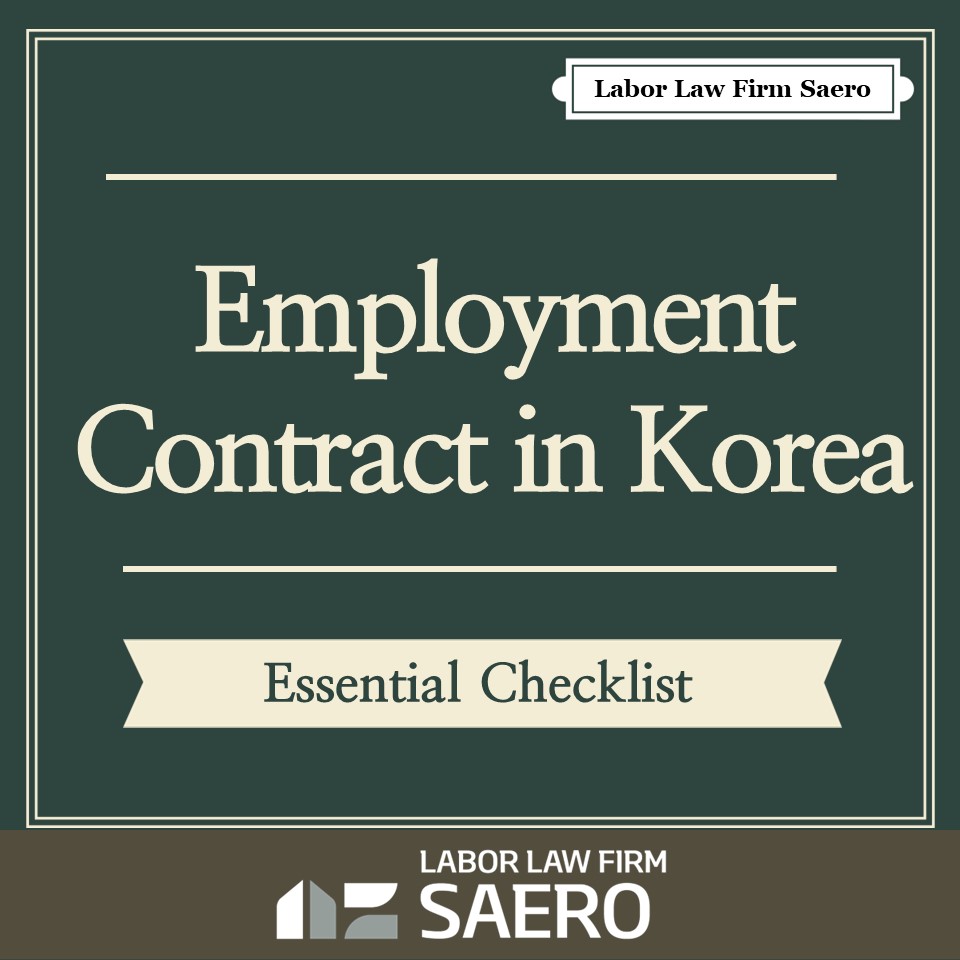Checklist for Korean Employment Contract: Comprehensive Guide to Employment Agreement in Korea
- Date2023/08/26 13:06
- Read 1,419

When drafting an Employment Agreement in Korea, there are components that must be diligently incorporated to ensure both legal compliance and clarity between the employer and employee. Here's a comprehensive guide to these essential elements, whether you're drafting an Employment Agreement for full-time permanent staff or those on fixed-term or part-time arrangements.
Permanent (Non-fixed term) & Full-time Employees:
1. Wages
Components of the wage, calculation method, and payment method must be specified as follows.
- Base salary
- Other allowances
- Calculation method (e.g., calculated from the 1st to the last day of the month, paid on the 10th of the following month)
- Payment method (e.g., through a bank account designated by the employee
2. Contractual Working Hours
Contractual working hours refer to the work hours agreed upon by the employer and employee within legally permitted limits. It distinguishes whether an employee is full-time or part-time.
3. Holidays
If an employee has perfect attendance for a week, the employer must guarantee at least one paid day-off, known as the paid weekly holiday.
For businesses with fewer than 5 employees, only paid weekly holidays need to be mentioned.
For businesses with 5 or more employees, it must also specify public holidays and substitute public holidays.
4. Annual Paid Leave
For businesses with fewer than 5 employees, there's no obligation to grant annual paid leave. Mentioning adherence to the Labor Standard Act is sufficient.
If there are 5 or more employees, details about annual paid leave, in line with or exceeding the Labor Standards Act, should be specified.
5. Place of Work & Job Description
The location where the employee will work and the job description needs to be specified.
Assigning an employee to a location other than the contractually agreed location is considered a 'transfer order' and legal requirements for a 'transfer order' must be met to legitimize such transfers.
Likewise, a change in job description also requires legal compliance.
6. Rules of Employment & Dormitory details
Businesses with 10 or more employees must have Rules of Employment. If there are Rules of Employment or dormitory rules, they must be included in the Employment Agreement.
Fixed-term & Part-time Employees:
- Note: A part-time employee is one who works fewer hours than full-time employees. For example, if the regular working hours are 40 hours but a certain employee's contractual working hours are only 38 hours, that employee is considered part-time.
In addition to the content mentioned for permanent, full-time employees, the following must also be included in an Employment Agreement for fixed-term & part-time employees.
1. Contract Duration
Fixed-term employees must have a specified end date to their contracts and it needs to be speicified.
2. Working Hour & Break Times
Working hours and break times are typically mentioned with the 'contractual working hours'. For part-time employees, especially those with variable hours, specifics are essential to prevent unfair overtime work. If the actual working hours exceed the hours mentioned in the Employment Agreement, overtime pay must be granted.
3. Working Dyas & Daily Working Hours
The days on which the employee will work and the number of hours they will work on those days should be specified. Especially for part-time employees, this is crucial, as they might have varying hours on different days.
In summary, being meticulous in the preparation of employment contracts is paramount to safeguard the interests of both the company and its employees. By adhering to the guidelines shared above, employers in Korea can foster a transparent working environment and minimize potential contractual disputes.
To learn more about Korean labor law, or to inquire about other services we provide, please email us at saero@saerolabor.com to request our firm profile or schedule a brief introductory call.
